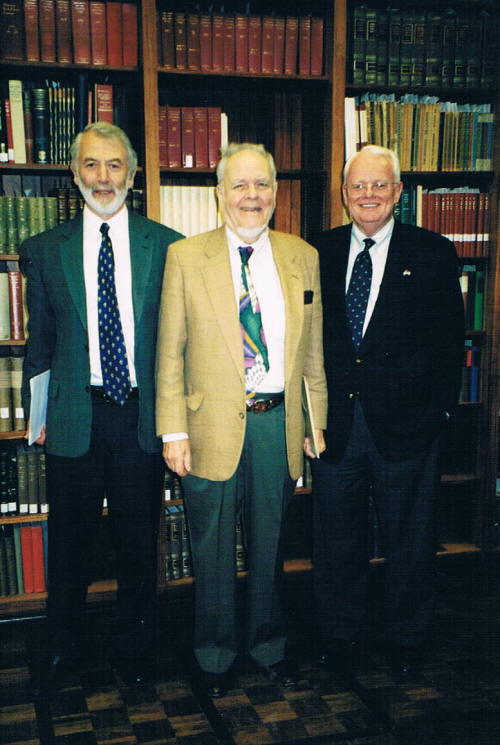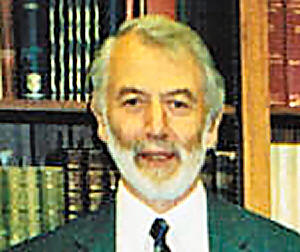|
Edited
by Frank R. Shaw, FSA Scot, Dawsonville, GA, USA
Email:
jurascot@earthlink.net

(L-R) Professor Kenneth Simpson, Professor Ross
Roy and Frank Shaw at the University of South Carolina's Thomas Cooper
Library
I have known Ken Simpson for
over 12 years, and I met him where most Burnsians meet other Burnsians –
attending conferences on Burns. This meeting was at Atlanta’s Emory
University and our Burns Club of Atlanta was host to a group of Scots from
across the pond who were members of the Robert Burns World Federation. The
program advertised that “a panel of Burns scholars will include Kenneth
Simpson…” - the first of the speakers listed. I heard Dr. Simpson speak on
Friday afternoon July 20, 2001, and he remained in Atlanta to speak at our
Burns Club meeting the next week. This was only the second Robert Burns
World Federation conference held in the United States. Sometime later, Ken
and I met again in Columbia, South Carolina at one of Ross Roy’s Burns
conferences, made famous by Patrick Scott, Elizabeth Sudduth and their
colleagues. It didn’t take long to have a meal with Ken and an even shorter
time to become friends.
In his professional life
Professor Simpson was one of the most significant Burns scholars in the
world. His books can still be found on eBay and in the better rare book
stores across America and in the United Kingdom. Not many Burns scholars can
say they were the opening act to famous Scottish singer Eddi Reader! I’m so
glad Susan and I were able to have lunch with him while attending the
University of Glasgow’s Centre for Robert Burns Studies conferences the past
two years. Each time we took the train to meet him so as not to subject Ken
to a trip to Glasgow as his health was already failing.
I want to thank Dr. Jennifer
Orr, now of Newcastle University, for sending the obituary below by
Professor Christopher Whatley which appeared in the Glasgow Herald this past
Tuesday. My heartfelt thanks to Chris (University of Dundee) for allowing me
to reprint this tribute for our readers. He replied promptly enough for the
obituary to be included in this week’s Robert Burns Lives!.
“Yesterday's funeral was a
low key affair, but well attended by many of Ken's friends and colleagues,
plus some family.” Chris went on to say, “I'd be perfectly happy - flattered
I think - for you to make whatever use of the obit you choose. I know it'll
be in good hands.”
Best wishes to Jennie and
Chris for making this chapter possible on Robert Burns Lives!.
(FRS: 10.10.13)
Professor Kenneth Simpson
Tuesday 8 October 2013
Scottish literature scholar and authority on Burns
Born: February 14, 1943; Died: September 28, 2013.

Professor Kenneth Simpson
Kenneth Simpson, who has died aged 70, was a distinguished
scholar, an authority on 18th century Scottish literature and above all
Robert Burns. His academic career was spent in Glasgow, at the universities
of Strathclyde and Glasgow. He was a pioneer in public engagement, the
driving force behind the Herald-supported, University of Strathclyde-sponsored
annual Burns conferences, which from their inauguration in 1990 brought
together academic researchers and Burns enthusiasts from the west of
Scotland and the wider world.
Born in Kilwinning, he was educated at Ardrossan Academy,
where in 1961 he was dux. He graduated from the University of Glasgow in
1965, before spending a year at what was then Jordanhill College, on a
secondary teaching training course which, allied to his personal gifts as an
inspiring lecturer, served him well for the rest of his life.
In 1969 he was appointed as a lecturer in English in the
newly established University of Strathclyde, which was then in the process
of recruiting a group of highly talented, energetic academics in the arts
and social sciences.
Although he had begun to publish papers and book chapters -
on Smollet and Galt for example - in the 1970s, it was in the following
decade that he became established as a major voice in Scottish literary
studies; 1988 saw the publication of The Protean Scot: The Crisis of
Identity in Eighteenth-century Scottish Literature, a seminal work that drew
on his PhD. Other important publications followed, not least his papers on
the tradition of flyting in Scottish literature, with his focus,
increasingly, falling on Burns.
In 1990 he became director of Strathclyde's annual Burns
International Conference, a role he continued to fulfil until 2004, when the
event moved to the Mitchell Library, with Professor Simpson as co-director.
For most of this time he was also (founding) director of the university's
Centre for Scottish Cultural Studies. Organising the Burns conferences
required enormous effort, not least to find sponsors, but also in cajoling
potential speakers from across Scotland but also from abroad, to fill what
were always richly-packed programmes. But, ably assisted by Cath Wales and
others, he succeeded in establishing the conference as one of Scotland's
major cultural landmarks with prestige sufficient to attract, for instance,
Prof Tom Sutherland, a Beirut hostage from 1985 until 1991, whose captivity
was made bearable by reciting Burns.
The legacy of the conferences endures, in the form of
published collections of the papers from some of them, which Prof Simpson
edited. The annual conferences also still run, albeit organised by the
University of Glasgow's Centre for Robert Burns Studies. The next, January
2014's - the 24th since 1990 - is being dedicated to Professor Simpson.
During the past 25 years Prof Simpson's reputation has
spread not only throughout Scotland but also reached the US and Russia -
where in 2006, in St Petersburg, he shared a platform at a Burns conference
with William McIlvanney. He held prestigious visiting posts in the
universities of South Carolina and Connecticut both of which he travelled to
on several occasions, as well as giving one-off lectures elsewhere in the US
and Canada.
Like Burns, he never forgot the people, and delighted in
performing for public audiences, his apparent modesty - and his endearing
habit of stroking his beard, philosopher-like- concealing a wry wit, a
gentle but telling sense of irony and a deeply held commitment to humane
values.
Accordingly, he was much in demand as a speaker at venerable
Burns clubs such as those in Greenock, Irvine and Perth. He is vividly
remembered in Dundee too, having appeared in 2006 as narrator at the
Repertory Theatre in a double-act with Eddi Reader. His only regret was that
as Reader was a singer, his audience weren't going to hear his two favourite
Burns poems, Holy Willie's Prayer and Tam O'Shanter.
Prof Simpson's accessible style of writing - apparent in his
1994 booklet, Robert Burns, published by the Association of Scottish
Literary Studies -has taken Burns into hundreds of Scotland's classrooms
while his Robert Burns (2005), with illustrations by Colin Baxter, opened up
Burns to yet another audience.
Although Prof Simpson retired from Strathclyde in 2003, by
which time he had been promoted to Reader, this was not the end of his
career but rather a sideways move across the city to Glasgow, where by 2008
he had become Honorary Professor in Burns Studies - the first incumbent - a
post he held until 2011.
His association with Glasgow induced a fresh bout of
academic endeavour resulting in a stream of papers on Burns, James
Macpherson and Robert Louis Stevenson; he also co-edited (with Patrick
Scott) a book of essays in honour of his brother-in-arms in Burns studies,
the late G Ross Roy of the University of South Carolina and, with Gerry
Carruthers, an online edition of the letters of James Currie, Burns' first
editor.
The flow continued, with his most recent publication, a
typically penetrating but at the same time highly illuminating examination
of the personal, political and intellectual influences on Burns as he
prepared the first, Kilmarnock (1786) edition of his poems, appearing in
Studies in Scottish Literature, 39, 2013.
The respect in which he was held by academics across the
disciplines and from many countries was demonstrated in his election as
president of the Eighteenth-Century Scottish Studies Society for 2008-9. At
the time of his death Professor Simpson was working with Ralph McLean and
Ronnie Young on an edited collection for the society, The Scottish
Enlightenment and Literary Culture.
Although he revelled in his role as a Scottish literary
ambassador, his roots were set deep in Ayrshire, where he lived throughout
his life, fitting for a Burns scholar who had family connections with the
poet - and to whose songs he had been introduced by his grandparents.
His boyhood was spent in Saltcoats, his adult life in West
Kilbride, with his beloved island of Arran usually in view. His affection
for Arran was transmitted through invitations to friends to join him on his
frequent holidays there (often insisting they hired heavy, steel-tubed
bicycles on which he'd lead them to Brodick - and the Ormidale hotel bar -
and back, by way of the gruelling String road); and by enticing his
Strathclyde students to attend his immaculately organised and enormously
stimulating reading parties in Blackwaterfoot.
Prof Simpson had a wide circle of colleagues and friends and
many more admirers among the general public and particularly the Burns
fraternity than is usual amongst academics. He will be missed by one and
all. In spite of the esteem in which he was held he was always courteous and
considerate. A gentle man, he bore his final illness with dignity and
courage. He was a devoted father and leaves a son, David.
Christopher A Whatley |

